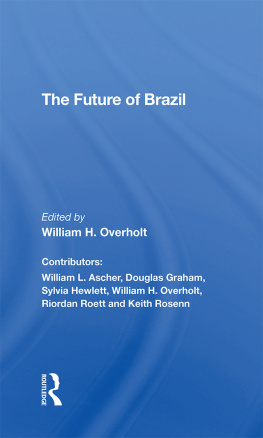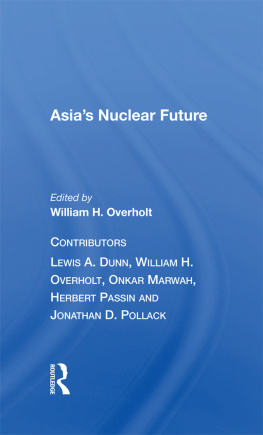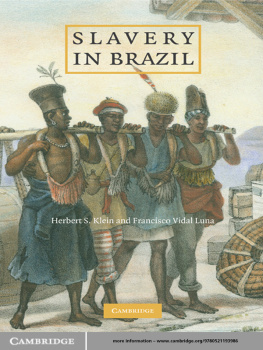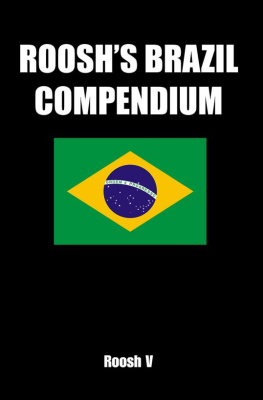The Future of Brazil
Other Titles in This Series
Brazil: Foreign Relations of a Future World Power, Ronald Schneider
Mexico's Economy: A Political Analysis with Forecasts to 1990, Robert E. Looney
Westview Special Studies on Latin America
The Future of Brazil edited by William H. Overholt
In this volume North America's most outstanding Brazil specialists analyze Brazil's foreign relations, politics, domestic economy, international economic relations, and relations with multinational corporations; they place heavy emphasis on prospects for the future as well as on analyses of the past. An overview chapter by the editor provides a coherent view of where Brazil has been, where it is today, and where it is heading. Dr. Overholt identifies the balance-of-payments crisis in the late 1970s as the key to Brazil's economic and political future and argues that the crisis will likely be surmounted. He predicts that, despite severe social inequality, Brazil is unlikely to experience a social revolution, but that strong political pressures will lead toward civilian government in the 1980s.
Based on an extensive examination of Brazil's situation and prospects, this is the most comprehensive study of Brazil available, and the only major one undertaken since the onset of the balance-of-payments crisis and the rise of influential pressures for a gradual return to civilian government. It includes a thorough discussion of why this country, with such extremes in inequality, and so many sanctuaries for guerrillas, faces no serious insurgency.
William H. Overholt has served on the Hudson Institute research staff since 1971 as a policy analyst specializing in foreign policy, Asian politics, and policy development. He is also a research associate at Columbia University's Research Institute on International Change and editor of Global Political Assessment.
The Future of Brazil
edited by William H. Overholt
Contributors:
William L. Ascher
Douglas Graham
Sylvia Hewlett
William H. Overholt
Riordan Roett
Keith Rosenn
First published 1978 by Westview Press, Inc.
Published 2019 by Routledge
52 Vanderbilt Avenue, New York, NY 10017
2 Park Square, Milton Park, Abingdon, Oxon OX14 4RN
Routledge is an imprint of the Taylor & Francis Group, an informa business
Copyright 1978 Taylor & Francis
All rights reserved. No part of this book may be reprinted or reproduced or utilised in any form or by any electronic, mechanical, or other means, now known or hereafter invented, including photocopying and recording, or in any information storage or retrieval system, without permission in writing from the publishers.
Notice:
Product or corporate names may be trademarks or registered trademarks, and are used only for identification and explanation without intent to infringe.
Library of Congress Cataloging in Publication Data
Main entry under title:
The Future of Brazil.
(Westview special studies on Latin America)
Includes bibliographical references.
1. BrazilEconomic conditions1945- Addresses, essays, lectures. 2. Brazil
Politics and government1954- Addresses, essays, lectures.
I. Overholt, William H. II. Ascher, William. III. Series.
HC187.F86 330.98106 78-19834
ISBN 13: 978-0-367-29232-4 (hbk)
To Monina
Contents
, William H. Overholt
, William H. Overholt
, William L. Ascher
, Riordan Roett
, Douglas H. Graham
, Sylvia Ann Hewlett
, William H. Overholt
, Keith S. Rosenn
One of Brazil's great writers, Gilberto Freyre, has compared Brazil to China. In many ways such a comparison provides a strikingly misleading guide to young, underpopulated Brazil with its open economy and open cultural style. But there is a striking analogy between the way Americans perceive China and the way they perceive Brazil. China has shifted in American perceptions from sentimental ally to ultimate enemy, from an inherently peaceful and disorganized society to an inherently hostile and totally organized one, from a weak and helpless country of starving masses to a bulwark against Soviet expansion. Such stark and conflicting images result from a lack of information combined with media hyperbole. The conflicting images bounce in and out of public consciousness, are transformed into one another, and even coexist in some people's minds.
Americans on the whole know less about Brazil, a country of similar size and potential, than about China. Brazil is often ignored and at times caricatured. Under the Nixon and Ford administrations Brazil was treated as an emerging pole of what was to be an inherently peaceful multipolar world. Its economic model represented one of the great hopes for the poor countries of the world. Henry Kissinger portrayed Brazil as a model of liberty. The Carter administration has thus far (1977 and early 1978) treated Brazil primarily as a pariah insensitive to the human rights of its own people and possessed of a dangerous yearning for nuclear weapons. Both images have attracted a wide following, and both persist. Neither bears more than a passing resemblance to reality.
To communicate the Brazilian reality, this volume presents an overview of the major political and economic trends, followed by more detailed and technical discussions of each major aspect of Brazil's polity and economy. I have sought to encourage diversity in both disciplinary and political perspectives, and the reader will find that the authors disagree about some things. But the degree of consensus among North American specialists about Brazil's current situation and future prospects is unique in my experience; one could never find so much agreement among students of China or Europe or Argentina. There is technical disagreement, and there is disagreement over whether one should attach adjectives of praise or blame to the principal trends, but the controversy over adjectives cannot disguise a consensus about the nouns that this editor finds more unsettling than reassuring.
The whole enterprise of characterizing current basic trends and speculating about the future is one most academics eschew. They do so for good reason: there is a much greater risk of being proved wrong about the future than about the past. But the responsible decision maker must make his best guess about the future and act upon it; any decision is a bet with the future, and most major government and business decisions are bets about the future ten or twenty years hence. The chapters of this book were written with decision makers in mind; we realize that any speculation may prove wrong in detail, but we also believe that to eschew opinions on the future is to abdicate responsibility.
The writers of this book are greatly indebted to MacMillan Bloedel Ltd., which paid for the study without necessarily endorsing any of the conclusions. We are also indebted to Hudson Institute, which provided the organizational setting and facilities for the study. I am grateful to Werner Baer, whose guidance in Brazil was the key to success of the field work for contributions to the study; Andrew Caranfil and Jimmy Wheeler of Hudson Institute contributed important ideas, data, and criticism. Helen Iadanza patiently typed and retyped the manuscripts in frantic succession.











